- Home
- Chinua Achebe
Collected Poems
Collected Poems Read online
Chinua Achebe
Collected Poems
Chinua Achebe was born in Nigeria in 1930. He was raised in the large village of Ogidi, one of the first centers of Anglican missionary work in eastern Nigeria, and is a graduate of University College, Ibadan.
His early career in radio ended abruptly in 1966, when he left his post as director of external broadcasting in Nigeria during the national upheaval that led to the Biafran War. He was appointed senior research fellow at the University of Nigeria, Nsukka, and began lecturing widely abroad.
From 1972 to 1975, and again from 1987 to 1988, Mr. Achebe was professor of English at the University of Massachusetts, Amherst, and also for one year at the University of Connecticut, Storrs.
Cited in the London Sunday Times as one of the “1,000 Makers of the Twentieth Century” for defining “a modern African literature that was truly African” and thereby making “a major contribution to world literature,” Chinua Achebe has published novels, short stories, essays, and children's books. His volume of poetry Christmas in Biafra and Other Poems, written during the Biafran War, was the joint winner of the first Commonwealth Poetry Prize. Of his novels, Arrow of God won the New Statesman–Jock Campbell Award, and Anthills of the Savannah was a finalist for the 1987 Booker Prize.
Mr. Achebe has received numerous honors from around the world, including the Honorary Fellowship of the American Academy of Arts and Letters and Foreign Honorary Membership of the American Academy of Arts and Sciences, as well as more than thirty honorary doctorates from universities in England, Scotland, the United States, Canada, Nigeria, and South Africa. He is also the recipient of Nigeria's highest honor for intellectual achievement, the Nigerian National Order of Merit, and of Germany's Friedenpreis des Deutschen Buchhandels for 2002. In 2007, he won the Man Booker International Prize for Fiction.
Mr. Achebe lives with his wife in Annandale-on-Hudson, New York, where they teach at Bard College. They have four children and three grandchildren.
Also by Chinua Achebe
Anthills of the Savannah
The Sacrificial Egg and Other Stories
Things Fall Apart
No Longer at Ease
Chike and the River
A Man of the People
Arrow of God
Girls at War and Other Stories
Christmas in Biafra and Other Poems
Beware Soul Brother
Morning Yet on Creation Day
The Trouble with Nigeria
The Flute
The Drum
Hopes and Impediments
How the Leopard Got His Claws (with John Iroaganachi)
Winds of Change: Modern Short Stories
from Black Africa (with others)
African Short Stories (editor, with C. L. Innes)
Another Africa (with Robert Lyons)
Home and Exile
To the Memory of My Mother
Contents
In Lieu of a Preface: A Parable
Prologue
1966
Benin Road
Mango Seedling
Pine Tree in Spring
The Explorer
Agostinho Neto
Poems About War
The First Shot
A Mother in a Refugee Camp
Christmas in Biafra (1969)
Air Raid
Biafra, 1969
An “If ” of History
Remembrance Day
A Wake for Okigbo
After a War
Poems Not About War
Love Song (for Anna)
Love Cycle
Question
Answer
Beware, Soul Brother
NON-commitment
Generation Gap
Misunderstanding
Knowing Robs Us
Bull and Egret
Lazarus
Vultures
Public Execution in Pictures
Gods, Men, and Others
Penalty of Godhead
Those Gods Are Children
Lament of the Sacred Python
Their Idiot Song
The Nigerian Census
Flying
Epilogue
He Loves Me; He Loves Me Not
Dereliction
We Laughed at Him
Notes
In Lieu of a Preface: A Parable
The Author had begun to worry about his own conduct. Perhaps he had not been fair to his poems. Yes, the same poetry that had surged from the depths to bring pain-soaked solace in the breach and darkness of civil war. Now he had stepped out alone into the light.
Everyone knows, of course, that an author cannot possibly bring things to such a pass unaided. He had plenty of help from his then Publisher, who filled the role of primary culprit, leaving the Author with the guilt only of acquiescence and quietude. For, in truth, the Author had raised the matter of his poems now and again with the Publisher, aloof in his towers and battlements in distant London, unready for strange images and cadences; and his reply had always been a telegraphic non sequitur: We do very well with your novels, you know.
In time the poems, like all children reared in hardship, grew tougher and wiser than their peers. They figured out that as offspring of a heedless parent they were fated to find their own way in the world. Their unguided wandering before long brought them face-to-face with a magician, Negative Capability, the holy man of the forest, shaggy-haired powered for eternal replenishment, alias Man Pass Man; and he blessed their struggle.
They went out early one morning in search of validation and returned at nightfall singing and dancing and bearing aloft the trophy of Commonwealth Poetry. A few ripples, but no waves. They contrived something breathtakingly audacious: they got Her Britannic Majesty to invoke six of their lines to end a royal admonition to her Commonwealth in crisis. Remember also your children for they in their time …
More ripples, but hardly any waves. If the Publisher heard any of it he kept the news to himself, and kept also his blurb on the book of poems in which he absentmindedly praised the novels.
What happened next is not very clear, though there is no lack of speculation. The one certain fact, however, is that the poems went silent. Did they go underground, as one rather romantic commentator would have it, to cultivate a secret guild of readers? Nobody can really say. The Author does recall, however, that at about this time he had begun to observe increasing numbers of intense-looking men and women in his audiences who would go up to the dais at the end of a reading and ask—or even demand—to know where to find the book he read from.
An American photographer with a fine portfolio of African material came on the scene at this time with a request to the Author for collaboration. So impressed was the Author by the photographs that he readily agreed to contribute to a catalog of their exhibition, and became joint author of a magnificent coffee-table book with the beguiling title of Another Africa. In his enthusiasm he found himself traveling across the United States to Seattle and Portland, Oregon, to read and speak at the exhibition.
And then things took a sudden, unexpected turn. The Author received an urgent call from a lady who identified herself as Curator of Another Africa exhibition, now showing in a major museum in the Midwest, in a city that had better remain nameless. She wanted to know from the Author how she might get hold of his book of poems in a hurry.
-Why in a hurry?
-Because visitors to the exhibition are taking away your poems from the catalog.
-Taking away my poems, how?
-Ripping them out. And carrying them away.
-My gentle readers? Oh, dear!
-What's that?
-Never mind.
The Author has at last found a new Publisher who, u
naware of these events, has set about publishing his collected poems. The Author, suitably chastened, is dreaming of a new day when peace will return to the affair of books, to wit: writing, publishing, and reading.
Prologue
1966
absentminded
our thoughtless days
sat at dire controls
and played indolently
slowly downward in remote
subterranean shaft
a diamond-tipped
drill point crept closer
to residual chaos to
rare artesian hatred
that once squirted warm
blood in God's face
confirming His first
disappointment in Eden
Nsukka, November 19, 1971
Benin Road
Speed is violence
Power is violence
Weight violence
The butterfly seeks safety in lightness
In weightless, undulating light
But at a crossroads where mottled light
From old trees falls on a brash new highway
Our separate errands collide
I come power-packed for two
And the gentle butterfly offers
Itself in bright yellow sacrifice
Upon my hard silicon shield.
Mango Seedling
Through glass windowpane
Up a modern office block
I saw, two floors below, on wide-jutting
concrete canopy a mango seedling newly sprouted
Purple, two-leafed, standing on its burst
Black yolk. It waved brightly to sun and wind
Between rains—daily regaling itself
On seed yams, prodigally.
For how long?
How long the happy waving
From precipice of rainswept sarcophagus?
How long the feast on remnant flour
At pot bottom?
Perhaps like the widow
Of infinite faith it stood in wait
For the holy man of the forest, shaggy-haired
Powered for eternal replenishment.
Or else it hoped for Old Tortoise's miraculous feast
On one ever recurring dot of cocoyam Set in a large bowl of green vegetables—
This day beyond fable, beyond faith?
Then I saw it
Poised in courageous impartiality
Between the primordial quarrel of Earth
And Sky striving bravely to sink roots
Into objectivity midair in stone.
I thought the rain, prime mover
To this enterprise, someday would rise in power
And deliver its ward in delirious waterfall
Toward earth below. But every rainy day
Little playful floods assembled on the slab,
Danced, parted round its feet,
United again, and passed.
It went from purple to sickly green
Before it died.
Today I see it still—
Dry, wire-thin in sun and dust of the dry months—
Headstone on tiny debris of passionate courage.
Aba, 1968
Pine Tree in Spring
(for Leon Damas)
Pine tree
flag bearer
of green memory
across the breach of a desolate hour
Loyal tree
that stood guard
alone in austere emeraldry
over Nature's recumbent standard
Pine tree
lost now in the shade
of traitors decked out flamboyantly
marching back unabashed to the colors they betrayed
Fine tree
erect and trustworthy
what school can teach me
your silent, stubborn fidelity?
The Explorer
Like a dawn unheralded at midnight
it opened abruptly before me—a rough
circular clearing, high cliffs of deep
forest guarding it in amber-tinted spell
A long journey's end it was though how
long and from where seemed unclear,
unimportant; one fact alone mattered
now—that body so well preserved
which on seeing I knew had brought me there
The circumstance of death
was vague but a floating hint
pointed to a disaster in the air
elusively
But where, if so, the litter
of violent wreckage? That rough-edged
gypsum trough bearing it like a dead
chrysalis reposing till now in full
encapsulation was broken by a cool
hand for this lying in state. All else
was in order except the leg missing
neatly at knee joint
even the white schoolboy dress
immaculate in the thin
yellow light; the face in particular
was perfect having caught nor fear
nor agony at the fatal moment.
Clear-sighted with a clarity
rarely encountered in dreams
my Explorer-Self stood a little
distant but somewhat fulfilled; behind
him a long misty quest: unanswered
questions put to sleep needing
no longer to be raised. Enough
in that trapped silence of a freak
dawn to come face-to-face suddenly
with a body I didn't even know
I lost.
Agostinho Neto
Neto, were you no more
Than the middle one favored by fortune
In children's riddle; Kwame
Striding ahead to accost
Demons; behind you a laggard third
As yet unnamed, of twisted fingers?
No! Your secure strides
Were hard earned. Your feet
Learned their fierce balance
In violent slopes of humiliation;
Your delicate hands, patiently
Groomed for finest incisions,
Were commandeered brusquely to kill,
Your melodious voice to battle cry.
Perhaps your family and friends
Knew a merry flash cracking the gloom
We see in pictures but I prefer
And will keep the darker legend.
For I have seen how
Half a millennium of alien rape
And murder can stamp a smile
On the vacant face of the fool,
The sinister grin of Africa's idiot-kings
Who oversee in obscene palaces of gold
The butchery of their own people.
Neto, I sing your passing, I,
Timid requisitioner of your vast
Armory's most congenial supply.
What shall I sing? A dirge answering
The gloom? No, I will sing tearful songs
Of joy; I will celebrate
The Man who rode a trinity
Of awesome fates to the cause
Of our trampled race!
Thou Healer, Soldier, and Poet!

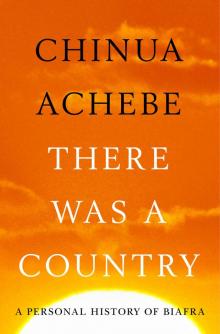 There Was a Country: A Memoir
There Was a Country: A Memoir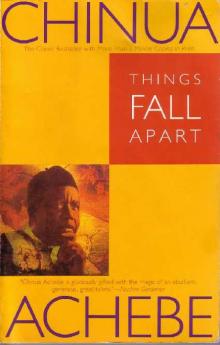 Things Fall Apart
Things Fall Apart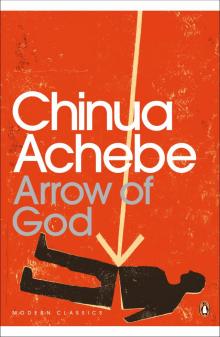 Arrow of God
Arrow of God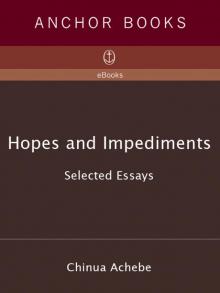 Hopes and Impediments: Selected Essays 1965-87
Hopes and Impediments: Selected Essays 1965-87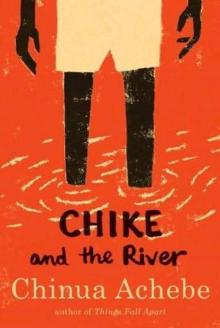 Chike and the River
Chike and the River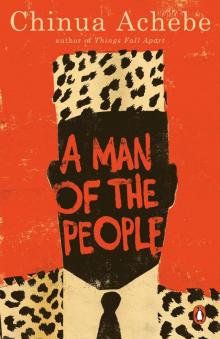 A Man of the People
A Man of the People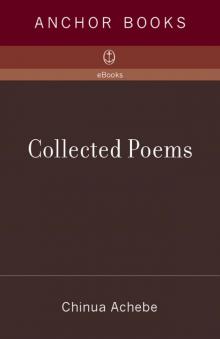 Chinua Achebe: Collected Poems
Chinua Achebe: Collected Poems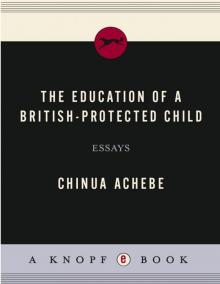 The Education of a British-Protected Child: Essays
The Education of a British-Protected Child: Essays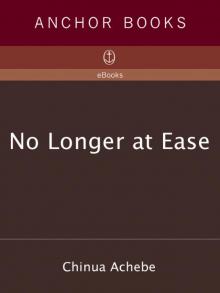 No Longer at Ease
No Longer at Ease Girls at War
Girls at War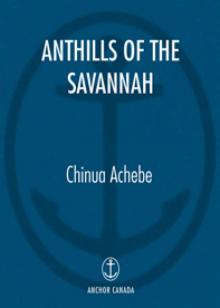 Anthills of the Savannah
Anthills of the Savannah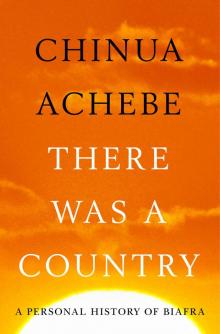 There Was a Country: A Personal History of Biafra
There Was a Country: A Personal History of Biafra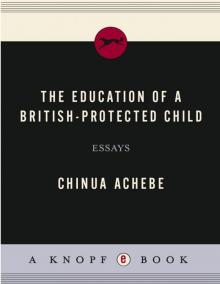 The Education of a British-Protected Child
The Education of a British-Protected Child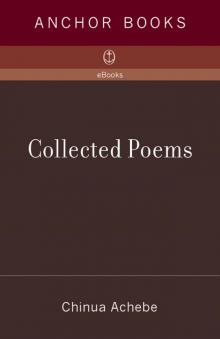 Collected Poems
Collected Poems